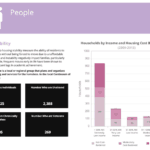Redefining the Corporate Value Chain: How Social Procurement Can Benefit Both Corporations and Social Businesses
The challenges of scale and the need for greater corporate involvement are perennial topics of discussion in the social business sector. But what if both of those needs could be met through a single strategy? Take a moment to imagine: What if we could harness the buying power of multinational corporations to scale social businesses and their impact?
One actionable strategy to do just that can be found in social procurement.
Social Procurement in a Nutshell
Social procurement is the practice of integrating social businesses into corporate value chains. By their very nature, social businesses have a direct social and/or environmental impact through their purpose-oriented business models – for example, by providing employment to the disadvantaged or supporting the circular economy. When these social businesses are contracted as suppliers in large corporate value chains, their ability to create impact increases. The total value created by that corporate value chain increases as well, going beyond the value of the goods and services provided and creating additional value for society, the planet and the company itself.
Social procurement can happen at almost every point in the corporate value chain, from the supply of raw commodities to create products, to logistics to manufacture and distribute them, to end-of-life services to eventually dispose of them. Indirect spending is also part of this value chain and should not be overlooked, since corporations use a number of related services, like office cleaning, that can present opportunities for social procurement.
The value of social procurement for corporations
Social procurement is not just a fancy term, it’s a growing movement around the world. SAP, for example, has committed to sourcing 5% of its addressable spend from social entrepreneurs and another 5% from diverse suppliers by 2025. Similarly, cross-industry initiatives in which companies commit to collectively use their purchasing power for social impact are gaining more and more traction: For instance, the U.K.’s Buy Social Corporate Challenge, which began with seven founding partners, currently has over 25 partners representing a wide range of industries, including multinationals such as Deloitte, Johnson & Johnson and Siemens.
While the impact of social procurement is obvious for social businesses, what value can it bring to their partner corporations? Yunus Social Business conducted qualitative interviews with more than 40 corporate leaders, social entrepreneurs and intermediary organisations that have extensive experience in these social procurement partnerships. Using information from these interviews and our preliminary research, we then created a survey for these 40+ research participants, the results of which we’ve shared in our report, “The Social Procurement Manual: A practical guide to integrating social businesses into corporate value chains.” The report also features real-life case studies from 10 of these organisations.
Based on this research, Yunus Social Business has identified the following benefits that corporations can enjoy from working with social businesses:
- Over 80% of respondents note an improvement in employee engagement and talent acquisition.
- Over 80% of respondents see social procurement as a way to trigger internal mindset shifts, culture change and corporate transformation.
- Over 50% of respondents say that social procurement helps companies reach environmental, social and governance (ESG) targets.
Additionally, our research highlights some bias-breaking findings about contracting social businesses:
- 80% of respondents find social businesses to be competitive on quality and supply assurance.
- Over 60% of respondents find social businesses to be competitive on price and volume.
In the Social Procurement Manual, Tim Coldwell, the President of Chandos Construction – the first B-corp certified commercial builder in North America – explained their core reason for working with the social business Embers Staffing: “The main driver was a desire to authentically live our purpose as an organisation. Lots of businesses run around and talk about organisational purpose, but we wanted to find a way to express that purpose beyond cutting a check to a charity. We wanted to embed a mechanism to address some of the greatest challenges in the world into our existing business model. But on top of that, Chandos actually gets a quality and cost-competitive service from suppliers such as Embers, especially as the construction sector is facing a workforce crisis – It costs us nothing to do that. We’re gonna hire those people anyways. There is an unconscious bias that a not-for-profit, a charity or a social enterprise is not efficient. But I see no evidence of that. And they actually give us a very loyal workforce.”
There can be some downsides to social procurement, including potential difficulty in finding and verifying social businesses, and challenges in adapting current work processes to social enterprises that may have a different way of working. To address both of these issues, Yunus Social Business offers an Unusual Partners Program, which offers corporate education and social business sourcing – and other resources also exist for corporations that are interested in the practice.
As illustrated by the research and the real-life cases presented in the Manual, social procurement is a tangible way for corporations not only to redefine value but to truly deliver it. Through small, deliberate shifts in the way corporate value chains are currently managed, the potential to create environmental and social impact is immense.
Note: The Social Procurement Manual, a how-to guide for industry practitioners interested in social procurement, was created by Yunus Social Business under our Business as Unusual series, as part of our mission to turn companies into a force for good. To learn more about social procurement and other corporate innovation strategies, reach out to jo.bautista@yunussb.com
Lucie Durand is Director of the Unusual Partners program, and Daniel Nowack is Managing Director at Yunus Social Business.
Photo courtesy of ACDI VOCA / David Osorio.
- Categories
- Social Enterprise



